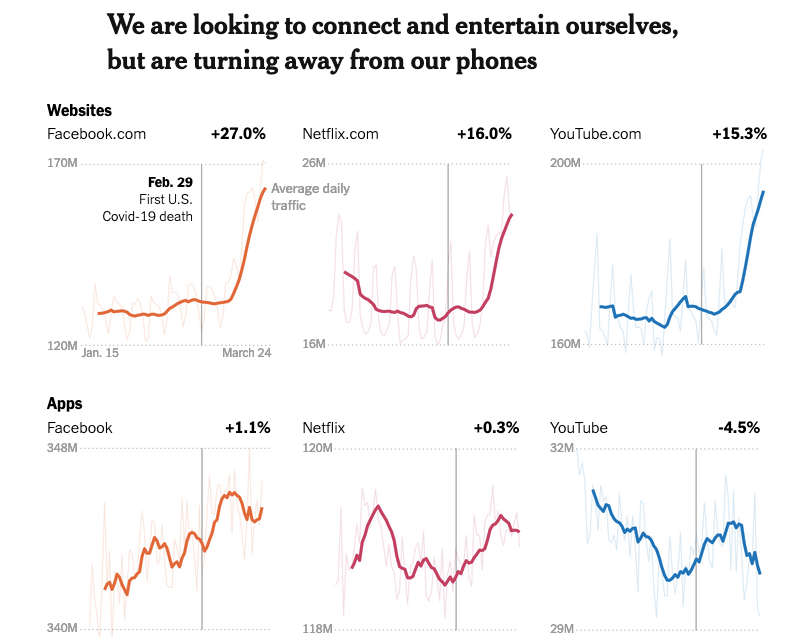Across the country, smart small business responses to COVID-19 are desperately needed. Small businesses are hurting. The COVID-19 pandemic has thrown healthcare and the economy into a tailspin that’ll take us years to recover from. But no group is being battered more right now than small business, which forms the backbone of the economy. Many are struggling to keep the lights on and ride this storm out.

Screengrab from a New York Times post titled “The Virus Changed The Way We Internet”
If there is a silver lining it’s that many small companies are going back to basics, paring services, limiting hours of operation and partnering with other local businesses—and finding a modicum of success. I think you can do the same, which is why I created the list below of the things you should be doing right now to ensure future success.
Smart small business responses to COVID-19
- Respect your mental health. If you run out of food, don’t fret. It means you had a good day. Spend time talking to your staff, your customers and going for a walk, as time permits. Now is not the time for isolation. You can even find one or two bright spots (e.g., more customers becoming interested in delivery, closer relationships with vendors, etc.). Also, spend time looking into the economic stimulus available to you; that’s no less of a priority.
- Show, don’t tell: Any and all social shares should include an image or video. If you’re a restaurant, share pictures of an amazing, popular dish. If you’re a repair or service company, show images of what you’re working on, your work area or your staff. Video is one of the best methods for fostering trust. Use it.
- Enlist the help of friends: Your friends and customers—hopefully, they are one and the same—are your best force multipliers. Ask them to drum up support online and offline. Ask them to share pics of your food or your service. Also, ask them to include a few comments about what they’ve enjoyed, including specific names of food or service items. This added element of social proof can prove especially convincing and persuasive.
- Clearly communicate new hours: If you have new hours, make sure they are listed online. You don’t want people showing up to an empty business.
- Offer daily or weekly updates with some personality on social: Many folks won’t visit your site, but everyone is on social media right now. Communicate with this captive audience. Let them know how you’re doing and how you’d like their support. A short, funny personality-driven video will go a long way toward making people feel good about visiting your business.
- Request a “like” for your Facebook page: When people “like” your page, your posts can receive a notification when you post on your page. Don’t be shy about sending invites, either. With shelter-in-place the norm throughout much of the country, people are spending countless hours on Facebook, where they can check in on friends and family members and overall feel connected to the rest of the world.
- Make public safety paramount: Communicate with your customers and the public the measures you have in place to keep staff and customers safe. Share your process and the steps you’re taking from prep to delivery. (The safety of food from restaurants and delivery services who serve them is a growing concern that will become a differentiator, especially for high-touch businesses, especially restaurants.)
- Streamline your menu. If you’re just now getting into delivery, keep the menu small and tight. Optimize your workflow. Daily specials help curb decision anxiety by your customers.
- If you don’t have a delivery service or online ordering, don’t worry. Toast POS has a product, Toast Now, which is great and worth a look. Also, small systems like Square can also provide you with a simple online ordering platform.
- Actively seek reviews: Though Google had disabled reviews, owing to not having enough staff to monitor spam, the review functionality has now been reopened. However, you should still actively seek reviews from other third-party sites, including Yelp, Angie’s List, Trip Advisor, etc. Ask customers to leave reviews wherever they seek them out for your vertical.
- Bonus: Businesses currently closed could use the time to log the names and contact information of prospects into your customer relationship management (CRM) system. What might seem like busywork is really smart business in these trying times.
What smart small businesses responses to COVID-19 are you employing?
(Special thanks to David Kutcher of Confluent Forms for his input on this post.)






